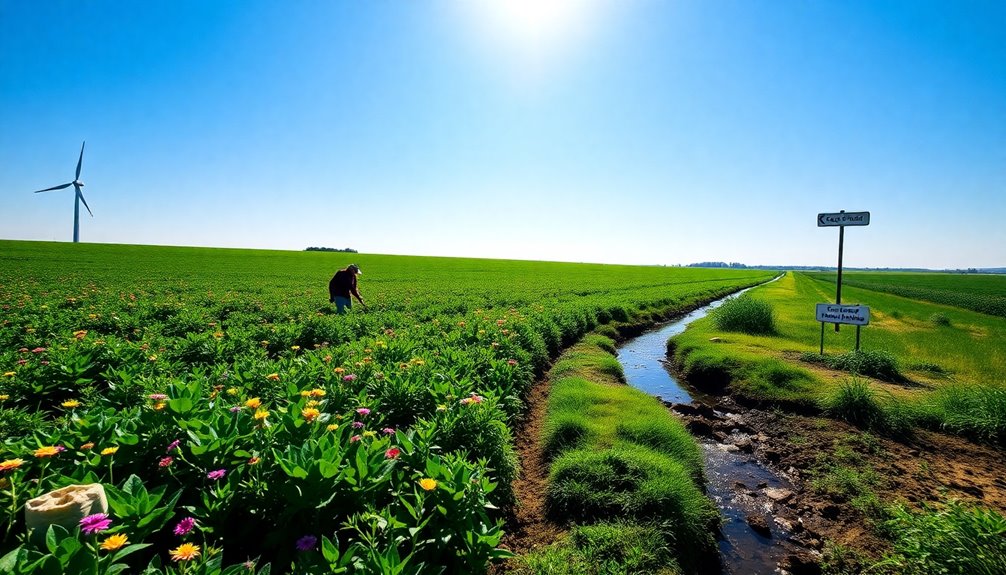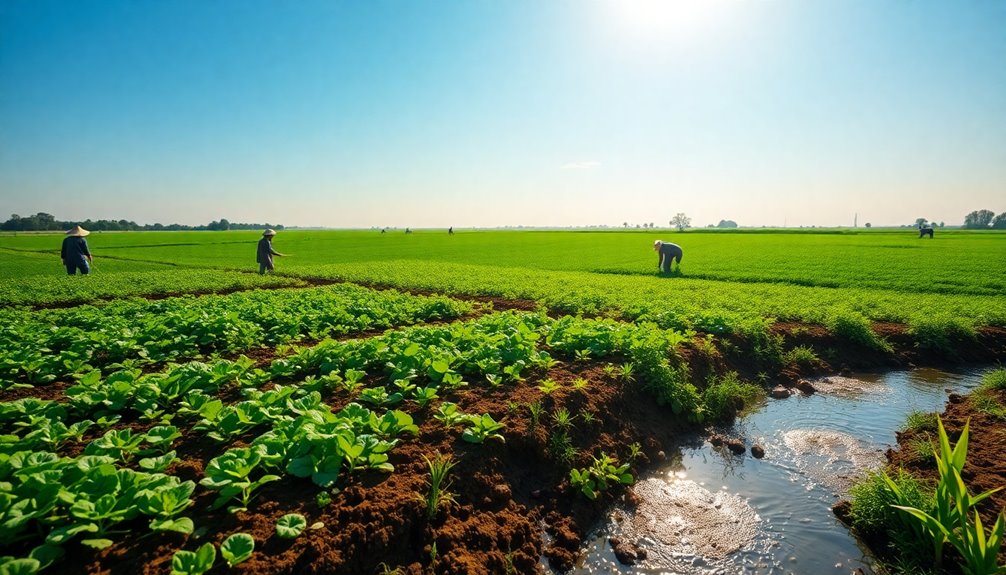Sustainable farm practices trim nitrate losses by promoting crop rotations and cover crops that enhance soil health. These methods not only minimize environmental impact but also maintain consistent harvests crucial for food security. By using technologies like solar irrigation, farmers improve efficiency and conserve water, ensuring their practices are both effective and eco-friendly. If you're curious about how these strategies can further enhance agricultural systems, there's plenty more to discover about sustainable farming benefits.
Key Takeaways
- Sustainable farming practices, such as crop rotation, effectively reduce nitrate runoff while maintaining high crop yields.
- Incorporating cover crops protects soil and enhances nutrient retention between growing seasons, minimizing nitrate loss.
- Advanced irrigation systems optimize water use efficiency, reducing runoff and preventing nitrate pollution in nearby water sources.
- Conservation tillage practices preserve soil structure and health, which supports nutrient balance and reduces reliance on synthetic inputs.
- Technological advancements in monitoring and management improve sustainable practices, leading to better harvests and lower environmental impact.

Sustainable farming practices are essential for maintaining the health of our planet and ensuring food security for future generations. By implementing strategies like crop rotation and diversification, you can significantly boost soil health and promote biodiversity. Growing different crops in sequence not only enriches the soil but also reduces the risk of pests and diseases. Organic farming further emphasizes this approach, focusing on natural methods that maintain ecological balance without relying on synthetic chemicals.
You'll find that conservation tillage and no-till farming play a crucial role in preserving the soil structure, which helps maintain soil health and reduces erosion. These practices allow organic matter to remain in the soil, enhancing its fertility over time. Agroforestry also contributes to sustainability by combining agriculture, forestry, and livestock, promoting efficient land use and biodiversity. Crop rotation enhances soil balance and reduces the need for chemical inputs, further benefiting the ecosystem. Additionally, solar-powered irrigation systems can enhance crop yields and efficiency, supporting sustainable practices in farming.
Studies show diverse crop rotations can effectively reduce nitrate runoff without compromising crop yields. This is vital, as excessive nitrates contribute to environmental issues, such as the dead zone in the Gulf of Mexico. By adopting sustainable intensification techniques, you can optimize crop rotations to minimize nitrate losses while maintaining ecosystem health.
Additionally, technological advancements like AI and advanced monitoring can help you fine-tune these practices for better efficiency. Incorporating cover crops is another way to protect soil during the off-season and enrich it with nutrients.
You'll want to ensure that these sustainable methods maintain yields comparable to conventional farming systems, as economic viability is key to widespread adoption. Water management practices, such as efficient irrigation systems and water recycling, are crucial for conserving resources and preventing pollution. These methods enhance crop water use efficiency and ensure resilience during droughts.
Ultimately, sustainable farm practices not only trim nitrate losses but also maintain harvests, contributing to a healthier environment and food security for the future. By embracing these methods, you play a vital role in promoting sustainability in agriculture.
Frequently Asked Questions
How Do Sustainable Practices Affect Crop Yield in Different Climates?
Sustainable practices positively affect crop yield across various climates by improving soil health and resource efficiency.
When you implement methods like crop rotation and cover cropping, you enhance soil fertility and reduce erosion.
In tropical areas, integrating trees can boost biodiversity and profitability.
You'll find that these practices not only maintain yields but can also increase them by 3-5%, depending on local conditions and how effectively you apply these techniques.
What Financial Incentives Exist for Farmers Adopting Sustainable Practices?
When you embrace sustainable farming, financial incentives rain down like a summer storm.
You'll find government grants and subsidies ready to support your conservation efforts. Tax credits can lighten your burden, making eco-friendly practices more wallet-friendly.
Plus, low-interest loans help you invest in sustainable equipment. Programs like the Conservation Stewardship Program offer guidance and financial assistance, ensuring you can cultivate your land while also reaping economic rewards.
It's a win-win!
Are There Specific Crops Better Suited for Sustainable Farming Techniques?
When you're considering crops suited for sustainable farming techniques, look into legumes, root vegetables, and drought-resistant grains.
These options thrive with less synthetic fertilizer and water. Leafy greens benefit from precise irrigation, while mature fruit trees can adapt to drier conditions.
How Can Consumers Support Sustainable Farming Initiatives?
You might think your choices don't matter, but they do! By supporting local farmers, buying certified organic products, and opting for sustainable meat, you're making a real difference.
Educating yourself on farming practices and reducing food waste can amplify your impact. Plus, advocating for fair trade and engaging with your community strengthens local agriculture.
Your everyday decisions can drive positive change and promote a healthier environment for everyone. So, get involved!
What Role Does Technology Play in Sustainable Farming Practices?
Technology plays a crucial role in sustainable farming practices by enhancing efficiency and minimizing environmental impact.
You can use precision agriculture tools like GPS and sensors to gather data, optimizing planting and irrigation. Drones help monitor crop health, while IoT devices ensure real-time adjustments.
Conclusion
In embracing sustainable farm practices, you're not just tending to the land; you're cultivating a legacy. Just like the timeless tale of Johnny Appleseed, who sowed seeds of change, your efforts can yield a harvest that nourishes both the earth and the community. By trimming nitrate losses, you're ensuring that future generations can reap the benefits of healthy soil and bountiful crops. So, step into this modern garden of Eden, and watch your sustainable choices flourish.





